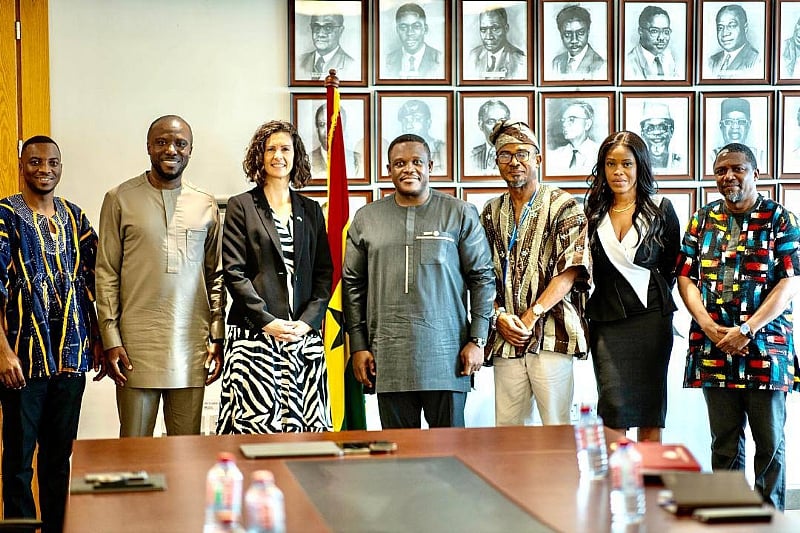Data synchronization, the process of maintaining consistency across multiple copies of a dataset, emerges as a critical driver of digital transformation and economic growth in Ghana. It acts as a foundational element for effective policymaking, efficient service delivery, and informed decision-making across various sectors. Minister for Communication, Digital Technology and Innovations, Sam George Nartey, underscores the significance of this process, highlighting its potential to unlock Ghana’s economic potential. Data synchronization ensures accuracy and currency of information, empowering stakeholders with reliable data for strategic planning and resource allocation. This, in turn, facilitates informed decision-making that drives development initiatives and fuels economic expansion. The Minister emphasizes the need for strategic investments in infrastructure, capacity building, and collaborative partnerships to fully harness the transformative power of data synchronization.
The importance of data synchronization stems from its ability to streamline processes, enhance productivity, and improve service delivery across government agencies and private sector organizations. Automated data collection, a key component of synchronization, minimizes manual errors and frees up human resources for more complex tasks. This increased efficiency translates to improved productivity and cost savings for both public and private entities. Moreover, access to accurate and up-to-date data enables government agencies to deliver more targeted and effective services to citizens, enhancing public satisfaction and promoting social well-being. By streamlining operations and improving service delivery, data synchronization creates a conducive environment for economic growth and improved quality of life.
Ghana’s commitment to leveraging data synchronization aligns with its broader digital transformation agenda. By prioritizing data-driven innovation and fostering collaboration among various stakeholders, the country aims to unlock its full economic potential. Investments in robust infrastructure, including advanced data storage and processing capabilities, are crucial for establishing a secure and reliable data ecosystem. Furthermore, building capacity through training and development programs empowers individuals and institutions with the necessary skills to manage and analyze data effectively. The Minister’s emphasis on collaboration underlines the importance of a multi-stakeholder approach, bringing together government agencies, private sector organizations, and civil society groups to share knowledge, resources, and best practices. This collaborative ecosystem will foster innovation and accelerate the adoption of data synchronization across various sectors.
The UK High Commissioner, Harriet Thompson, commends Ghana’s commitment to leveraging technology for economic development and expresses interest in collaborating on data synchronization initiatives. This potential partnership highlights the importance of international cooperation in driving digital transformation and sharing expertise. The UK’s support could contribute significantly to Ghana’s capacity-building efforts and provide access to cutting-edge technologies and best practices in data synchronization. Collaborative projects and knowledge exchange programs can accelerate the implementation of effective data synchronization strategies and contribute to Ghana’s overall economic growth. The UK’s expertise in data management and digital governance can complement Ghana’s efforts to establish a robust and secure data ecosystem, fostering trust and promoting data-driven decision-making.
Data synchronization presents a significant opportunity for Ghana to enhance its economic growth and development trajectory. By prioritizing investments in infrastructure, capacity building, and collaborative partnerships, the country can unlock the full potential of data-driven innovation. The Minister’s vision for a data-synchronized Ghana emphasizes the importance of accurate, up-to-date data for informed decision-making across all sectors. This approach not only streamlines processes and improves service delivery but also creates a more transparent and accountable governance framework. As Ghana continues its digital transformation journey, data synchronization will play a pivotal role in driving economic progress, improving public services, and enhancing the lives of its citizens.
In conclusion, data synchronization stands as a crucial enabler of digital transformation and economic growth in Ghana. By promoting data-driven innovation and fostering collaboration among stakeholders, the country aims to unlock its full potential and achieve sustainable development. The Minister’s emphasis on accurate, up-to-date data for informed decision-making underscores the transformative power of data synchronization in driving economic progress, improving public services, and enhancing the lives of citizens. International collaborations, such as the potential partnership with the UK, further strengthen Ghana’s commitment to leveraging technology for development. As Ghana embraces data synchronization as a core component of its digital transformation strategy, it positions itself for continued economic growth and improved societal well-being.














